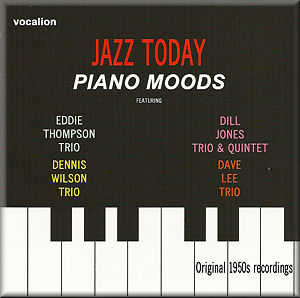Eddie Thompson Trio
1. Body and Soul
Eddie Thompson - Piano
Benny Goodman - Drums
Barry Hamilton - Bass
2. Perdido
3. Rose Room
Eddie Thompson - Piano
Allan Ganley - Drums
Bill Sutcliffe - Bass
4. Iíve Got a Pocketful of Dreams
5. Leverís Leap
6. Mobile
7. Everything Happens to Me
Eddie Thompson - Piano
Jack Fallon - Bass
Cedric West - Guitar
Dave Lee Trio
8. Excuse for the Blues
9. On the Alamo
Dave Lee - Piano
Lennie Bush - Bass
Allan Ganley - Drums
Dennis Wilson Trio
10. Ellington Medley: "C" Jam Blues, Take the "A"
Train, Drop Me Off in Harlem, Donít Get Around Much Anymore
Dennis Wilson - Piano
Jack Llewellyn - Guitar
Frank Clarke - Bass
Dill Jones Trio
11. Opus Caprice
12. Yesterdays
13. In a Mist
14. Rufus
Dill Jones - Piano
Frank Clarke - Bass
Eddie Taylor - Drums
Dill Jones Quintet
15. Easy
16. Paulís Pal
17. Rayís Blues
18. Jordu
Dill Jones - Piano
Ray Premru - Bass trumpet
Duncan Lamont - Tenor sax
Don Lawson - Drums
Spike Heatley - Bass
Dill Jones Trio
19. Moonglow
20. íDeed I Do
21. Viperís Drag
Dill Jones - Piano
Major Holley - Bass
Phil Seamen - Drums
I am so old that I can remember the EP - a form of extended-play
record which was around from the 1950s for several decades, and was
like a single (with a diameter of seven inches) but usually contained
four tracks instead of two. It virtually disappeared when the compact
disc arrived, but it was a useful type of record as it offered the
chance to sample an artist's work without making musicians feel that
they had to produce enough tracks to fill a CD.
In the 1950s, quite a number of EPs were issued under the title Piano
Moods, and this CD assembles several of them to remind us about
four of the top British pianists of that period.
First up is Eddie Thompson, who studied the piano at the same time
and at the same schools as George Shearing (the Lindon Lodge School
for the Blind in Wandsworth and later in Swiss Cottage). Like Shearing,
he emigrated to the USA, but for a shorter period: from 1962 to 1972.
He became well-loved as a resourceful pianist who (like George Shearing)
had a likeable sense of humour. This humour is evident in several
tracks here - most notably in Body and Soul, which includes
references to Barwick Green (the theme tune for the radio serial
The Archers), Yes, We Have No Bananas, How Much is That
Doggie in the Window? and a famous newsreel signature tune. Eddie's
passion for quotations leads him astray in Perdido, where a
quote from Pretty Baby is fumbled. But these tracks illustrate
not only his playfulness but also his expert technique.
Dave Lee is a pianist who possibly became better known as a composer
and arranger, writing music for films, TV and revues (including Goodness
Gracious Me for Peter Sellers and Sophia Loren!). His two mid-tempo
tracks here betray the strong influence of Erroll Garner. Dennis Wilson
contributes a medley of four tunes associated with the Duke Ellington
band. He performs them with a certain amount of elaboration, but the
presence of guitarist Jack Llewellyn adds some welcome variety after
continuous trios of piano, bass and drums.
More than half the album's 21 tracks are devoted to Dill Jones, another
British pianist who emigrated to the States (he lived in New York
from 1961 until his death in 1984). The first four tracks from Dill
are by his trio and exemplify his wide range of tastes and styles:
a tune by Al Haig (Opus Caprice), a standard (Jerome Kern's
Yesterdays), a classic from the 1920s (Bix Beiderbecke's In
a Mist) and an original composition (Rufus). Dill takes
In a Mist at a more measured pace than Bix's original, with
some different flourishes.
More variety is provided by the addition of extra members to Dill
Jones's trio for tracks 15 to 18. The main attractions in this line-up
are the glorious tenor sax of Duncan Lamont and the trombone-like
bass trumpet of Ray Premru. Paul's Pal is a tune by Sonny Rollins
which sounds strangely familiar to me, although I can't place why.
Perhaps it's just from hearing it on Sonny's album Tenor Madness;
it is certainly a memorable piece. The quintet's version of Jordu
hasn't quite got the bite of the classic interpretation by Max Roach
and Clifford Brown. The drums here and elsewhere tend to be recorded
very low in the mix, which dulls the impact of some tracks.
The album finishes with three more tunes by the Dill Jones Trio,
including a comparatively fast version of Moonglow, which demonstrates
the drive and imagination of Dill's piano playing. And Viper's
Drag proves his facility in stride piano.
This album is a salutary reminder of the talent among British pianists
of the 1950s - a talent which is often overlooked.
Tony Augarde
